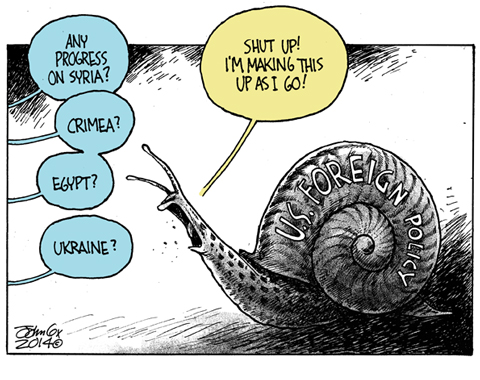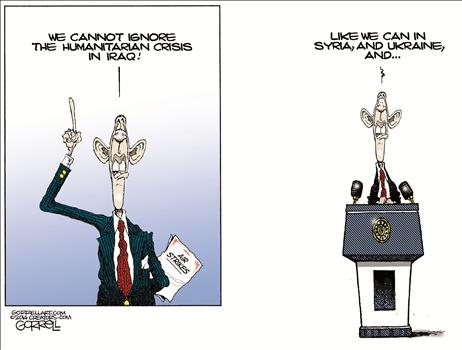wkmac
Well-Known Member
February 29, 2008 The Foreign Policy Follies
A cavalcade of error, right, left and center by Justin RaimondoI must be getting old. This virus, or whatever the heck it is, really knocked me for a loop. It's funny, but I recall thinking, just before I came down with this, that I'd managed to entirely avoid getting sick this winter, and – whammo! Hubris – it's the bane of mankind.
At any rate, that's my feeble excuse for not writing the usual 3000-word analysis of one particular aspect of the federal government's overseas shenanigans. Instead, we're going on a whirlwind tour of the current foreign policy follies, at home as well as abroad.
Turkey's invasion is escalating pretty quickly, with Ankara declaring their "temporary" incursion could last as long as a year, and Baghdad demanding "Troops Out!" The US is the monkey in the middle, with defense secretary Robert Gates averring that the Turks had better get out in "days," or, at most, "a week or two." The Turks, for their part, maintain their "right" to cross the border with Iraq (really Kurdistan) in hot pursuit of Kurdish Workers Party (PKK) "terrorists," who attack civilian targets in Turkey proper.
This is a clarification of the preemptive war doctrine, adopted by the Bush administration as the core canon of our post-9/11 foreign policy theology, which makes it clear that this "principle" is not universally applicable: it applies only to the United States, and selected allies – of which Turkey certainly is not one. And in spite of his much-vaunted "universalism," I'm sure John McCain is willing to make an exception in this case.
Speaking of McCainiacs, the McCainiac-in-chief has staked out a unique position on the Iraq war question, one that addresses the history of the dubious intelligence and false premises that led us into that costly conflict in terms of a simple, easy-to-understand slogan: That was then, this is now.
Addressing Barack Obama directly as the putative Democratic nominee, McCain again averred that Obama would hand over Iraq to Al Qaeda, and countered the contention that bin Laden's minions would never have gained entry if not for the US invasion;
"On the issue of my differences with Senator Obama on Iraq, I want to make it very clear: This is not about decisions that were made in the past. This is about decisions that a president will have to make about the future in Iraq. And a decision to unilaterally withdraw from Iraq will lead to chaos."
Ignore the past, and plunge into the future. Irrespective of one's position on the war – or the presidential race – one has to ask: is this really how a self-proclaimed "conservative" formulates policy?
Conservatism, as I've been led to understand it, is all about empiricism: a methodology that upholds the superiority of the tried-and-true, and validates a reverence for tradition. However, when the traditionalists – or their leaders – declare, in effect, that history is bunk, we have truly entered Bizarro World.
Conservatives are really lost in the wilderness these days, and the death of William friend. Buckley, Jr., has proved to be the occasion for a lot of commentary on conservatism, past and future. I did a short piece for Taki's Top Drawer, which you can read here: I would add that some of the commentary which has come out, hailing Buckley for his purging of the "isolatonist" Right from the ranks of the conservative movement, is coming from ostensibly antiwar liberals, like Chris Matthews the other day on MSNBC, who made just this point. Yet if we had more "isolationists" (i.e. pro-peace Ron Paul types) in the GOP, we would never have been in the mess we are today. And then, I guess, Democrats like Señor Matthews wouldn't have the war as a campaign issue. Once a partisan, always a partisan. Now if we're going to have partisanship over at MSNBC, why not give Pat Buchanan his own show – he'd be more than a match for Matthews and Keith Olbermann.
The good guys on the right, over at The American Conservative, have a new regular blog written by the estimable Daniel Larison, and I urge you to go over there and check it out if you want to know what's right with the conservative movement of today. Continuing our discussion of the other day: Yes, I understand his point that the Obama phenomenon is not going to cure all our foreign policy ills, and I don't fault him at all for trying to tamp down my apparent Obama-mania. I don't think I've made it clear enough that I'm more interested in Obama's supporters than I am in Obama: that is, the phenomenon is more significant than the man. At any rate, now that I haven't cleared that up, I should note that, as if on cue, the tail-end of the Democratic debate seems to confirm Larison's point.
end of Part 1
A cavalcade of error, right, left and center by Justin RaimondoI must be getting old. This virus, or whatever the heck it is, really knocked me for a loop. It's funny, but I recall thinking, just before I came down with this, that I'd managed to entirely avoid getting sick this winter, and – whammo! Hubris – it's the bane of mankind.
At any rate, that's my feeble excuse for not writing the usual 3000-word analysis of one particular aspect of the federal government's overseas shenanigans. Instead, we're going on a whirlwind tour of the current foreign policy follies, at home as well as abroad.
Turkey's invasion is escalating pretty quickly, with Ankara declaring their "temporary" incursion could last as long as a year, and Baghdad demanding "Troops Out!" The US is the monkey in the middle, with defense secretary Robert Gates averring that the Turks had better get out in "days," or, at most, "a week or two." The Turks, for their part, maintain their "right" to cross the border with Iraq (really Kurdistan) in hot pursuit of Kurdish Workers Party (PKK) "terrorists," who attack civilian targets in Turkey proper.
This is a clarification of the preemptive war doctrine, adopted by the Bush administration as the core canon of our post-9/11 foreign policy theology, which makes it clear that this "principle" is not universally applicable: it applies only to the United States, and selected allies – of which Turkey certainly is not one. And in spite of his much-vaunted "universalism," I'm sure John McCain is willing to make an exception in this case.
Speaking of McCainiacs, the McCainiac-in-chief has staked out a unique position on the Iraq war question, one that addresses the history of the dubious intelligence and false premises that led us into that costly conflict in terms of a simple, easy-to-understand slogan: That was then, this is now.
Addressing Barack Obama directly as the putative Democratic nominee, McCain again averred that Obama would hand over Iraq to Al Qaeda, and countered the contention that bin Laden's minions would never have gained entry if not for the US invasion;
"On the issue of my differences with Senator Obama on Iraq, I want to make it very clear: This is not about decisions that were made in the past. This is about decisions that a president will have to make about the future in Iraq. And a decision to unilaterally withdraw from Iraq will lead to chaos."
Ignore the past, and plunge into the future. Irrespective of one's position on the war – or the presidential race – one has to ask: is this really how a self-proclaimed "conservative" formulates policy?
Conservatism, as I've been led to understand it, is all about empiricism: a methodology that upholds the superiority of the tried-and-true, and validates a reverence for tradition. However, when the traditionalists – or their leaders – declare, in effect, that history is bunk, we have truly entered Bizarro World.
Conservatives are really lost in the wilderness these days, and the death of William friend. Buckley, Jr., has proved to be the occasion for a lot of commentary on conservatism, past and future. I did a short piece for Taki's Top Drawer, which you can read here: I would add that some of the commentary which has come out, hailing Buckley for his purging of the "isolatonist" Right from the ranks of the conservative movement, is coming from ostensibly antiwar liberals, like Chris Matthews the other day on MSNBC, who made just this point. Yet if we had more "isolationists" (i.e. pro-peace Ron Paul types) in the GOP, we would never have been in the mess we are today. And then, I guess, Democrats like Señor Matthews wouldn't have the war as a campaign issue. Once a partisan, always a partisan. Now if we're going to have partisanship over at MSNBC, why not give Pat Buchanan his own show – he'd be more than a match for Matthews and Keith Olbermann.
The good guys on the right, over at The American Conservative, have a new regular blog written by the estimable Daniel Larison, and I urge you to go over there and check it out if you want to know what's right with the conservative movement of today. Continuing our discussion of the other day: Yes, I understand his point that the Obama phenomenon is not going to cure all our foreign policy ills, and I don't fault him at all for trying to tamp down my apparent Obama-mania. I don't think I've made it clear enough that I'm more interested in Obama's supporters than I am in Obama: that is, the phenomenon is more significant than the man. At any rate, now that I haven't cleared that up, I should note that, as if on cue, the tail-end of the Democratic debate seems to confirm Larison's point.
end of Part 1





